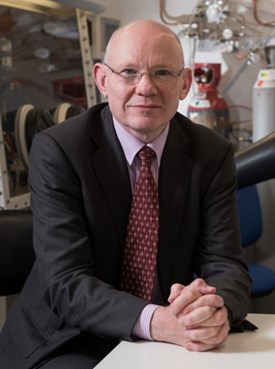Vice-President of the Royal Society, Professor Peter Bruce, considers what is needed to meet net zero emissions targets.

The immediate deployment of market-ready low carbon technologies is a vital part of the transition to net zero emissions, however, the deployment of existing technologies will not achieve net zero alone and will not even meet our 2030 and 2035 targets. The UK has an ambition to decarbonise our electricity sector by 2035 yet no viable solution to the over 50 TWhs of energy storage which are likely to be needed to make such a system work and keep the lights on.
To reach the target of all electric vehicles by 2035 we shall need more research and development on batteries and electric power-trains, the former to deliver faster charging, longer range and lifetime at lower cost. For other forms of transport like HGVs, shipping and planes we do not yet have the sustainable liquid fuels that can make them zero emissions.
What is needed is a triple track approach of deployment, development and research: deploying at scale those technologies that are ready, developing and demonstrating at scale those that are not, and creating new solutions, through research, to develop the knowledge and capability to address the decarbonisation challenge. All three activities need to be coordinated and take place in parallel. Such co-ordination would identify barriers to market-ready technologies, rapidly pull through emerging technologies and keep developing new ideas that may seem like science fiction but can become science fact.
Research and development are not just for the very long term, they will deliver solutions on a range of timescales from one to 20+ years. The process from research breakthroughs to commercialisation isn’t linear, rather a constant feedback loop through research and innovation, they are intimately intertwined partners. This can be seen with some of the immediately deployable technologies such as solar and wind for generating electricity and heat pumps for domestic heating. Costs and efficiencies are improving but there is much more to do and it will take research to achieve that.
Separately, there is research that is currently taking place that has the potential to create a step change in decarbonisation but will not be deployable until after 2030. Countries like China and the US, the largest single emitters of CO2, (accounting for around 42 % of global emissions) see technological innovation as absolutely key to delivering decarbonisation, and the UK is well placed to work with global partners. Examples of essential research that is required to meet both the net-zero target and beyond to zero-carbon solutions include catalysis and membranes for hydrogen fuel cells and electrolysers, the next generation of batteries and sustainable liquid fuels.
Targeted investment in research and development will be an essential part of the drive to decarbonise the economy and collaboration between private and public sectors will help accelerate innovation. The commercialisation of new green technologies are needed to produce the wealth necessary to fund mitigation and adaptation. It will also be crucial in bringing those innovations to our homes, streets, places of work and to our industries
Continuous monitoring and evaluation is needed to ensure that the impacts of new technologies, both positive and negative, are identified as they are deployed, and research and development is commissioned to improve and replace them. Innovation is a never ending process that the UK will have continue to invest in if we want to remain a world leader.
Research and development must also integrate adaptation and mitigation to maximise the co-benefits and avoid unintended consequences. For example, increased research and uptake in bioenergy could, if not well-designed and coordinated, lead to increased pollution and detrimental impacts on biodiversity and ecosystem resilience.
A whole energy systems approach is required to consider the interactions between technical, economic, environmental, and social factors relevant to the net zero challenge. The Government has the opportunity to convene an independent and interdisciplinary group of world class experts to advise on which technologies are ready for deployment or development, and where research is required to support continuous improvement and innovation. The UK’s expertise is perhaps one of the key advantages we have in making change and in capitalising on that change to drive our economy and create jobs.
See more
Explore some of the Royal Society's key work on climate change around COP26, the United Nations climate change conference.

